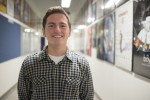It is another typical day in Atascadero for Steve Harrison: He and his wife wake up at 6 a.m., perform daily barnyard tasks and go on a scenic hike, hand in hand.
This seemingly everyday life is what Jack Harrison, a fourth-year international development studies student, focuses on in his documentary, “The Outlier.” At the Shorttakes Student Film Festival put on by the Campus Events Commission on May 15, Harrison’s documentary won audience’s choice, awarded to the film that receives the most votes at the finale event.
In filming “The Outlier,” Harrison followed his uncle, a retired Secret Service agent, for a day. His uncle provides an interview voice-over for the short documentary. After being diagnosed with lung cancer in 2007, Harrison’s uncle was given six to eight months to live. Now, six-and-a-half years later, Harrison said that his uncle currently tries to live each of his days to the fullest.
“It’s kind of a cliché saying, but you can’t really control what’s given to you, but you can control where you go from there,” Harrison said about his uncle’s life philosophy.
Once his uncle received the diagnosis, Harrison said his demeanor completely switched as he began to incorporate meditation and self-reflection practices into his daily life. Harrison said that with his uncle’s backstory as a Secret Service agent and his ongoing fight against cancer, Harrison decided upon his uncle as the subject for his documentary production class this year.
The class, taught by Thomas Burns, a lecturer with the UCLA School of Theater, Film and Television, compresses the making of a documentary into a quarterlong process. After his premise was decided, Harrison said he went up to Atascadero to complete all of the filming in only a few days with one inexperienced crew member, his father.
“All I did was pretty much do whatever I was told in setting up equipment and testing lights,” said Bob Harrison, Jack Harrison’s father.
Disregarding the advice of his professor to take some experienced crew members with him because of the distant filming location, Harrison took on the project more or less alone. Burns said he thinks Harrison learned his lesson about the collaborative process that film demands, but Harrison still pulled it off. Harrison said his film’s success had to do with the low-pressure environment of following his uncle and his uncle’s wife around during their typical daily routine.
“It was very little direction that I had to give them, which I think really helped with the film’s authenticity of their lives,” Harrison said.
Burns said Harrison has an ability to empathize with his subjects in a very deep way, which is a sign of a great documentary filmmaker.
“(Harrison) has a good sense of the emotional arch of a narrative, and that’s something that is really rewarding to see in a student,” Burns said.
Conveniently, Harrison said he was just finishing editing “The Outlier” when he got the email announcing the submission deadlines for Shorttakes. Harrison said he had attended the film festival as a first year, and it was the first time he realized students were capable of making such high-caliber films.
Harrison said, in coming full circle from his first year to his fourth year, experiencing Shorttakes as a participant rather than an audience member felt different. It now provided him with the opportunity to share the film that had become such a big part of his life with many of his family and friends.
“I’m probably a little biased,” Harrison’s father said, “But I thought it was the best film there.”
